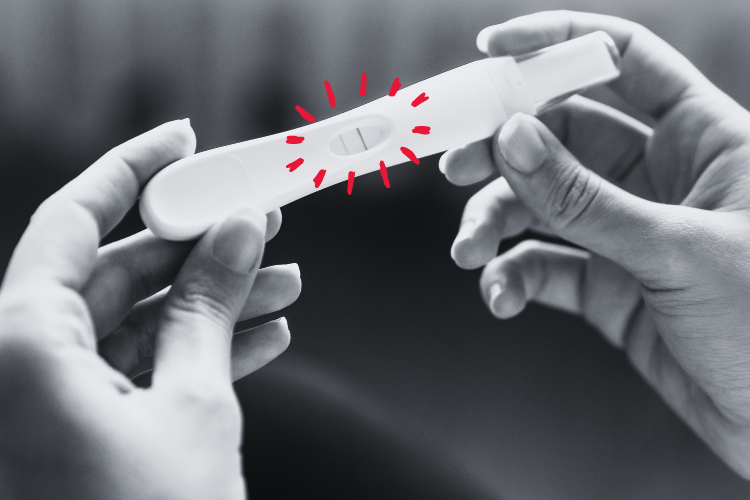
How Judaism Helped Me Through My Abortion
When I was seventeen I was rarely approached by boys my age. My one date was when my good friend from Hebrew school asked me to his prom. While everyone around me was going out and getting into relationships, I went home every night to make more AP Art History flashcards.
The concept of desirability is cultural, and sex was “cool” or “mature,” a symbol that you had crossed over from the world of child to adult. I was looking for validation that I was ready for this crossover, that there wasn’t anything physically off-putting about me, that I was desirable. At 17, when I got tired of waiting, I took to a dating app.
A man nearly ten years my senior asked me out, and what we ended up doing in the back of my car was not entirely what I wanted to have happen. I didn’t stop it, but this man could sense how inexperienced, vulnerable, and desperate I really was––and, to be fair, I didn’t even view his behavior as predatory at the time. I was happy someone had noticed me, despite my feeling uncomfortable.
I ended up losing my virginity to this man, and he was well aware that I was underage. Afterwards I wept in my car for a good hour, bleeding heavily through two menstrual pads. He told me he loved me, and made me believe this was something I wanted. In some twisted way it was what I wanted, to be noticed and desired, so I pushed away any thought that I was a victim. I detached myself.
The damage was done. As I approached my twenties I gave into my trauma and kept trying to prove that I was desirable, grown. Most of the time I didn’t demand the use of a condom. I couldn’t speak up or protect myself. With the right help I started to unpack what had occurred when I was young. How my first sexual experience had molded my sex practices, contributed to my loss of voice, of autonomy.
But first, I had to go through one of the most emotionally destructive experiences of my life. Standing there in my childhood bathroom, staring at a pregnancy test, praying that it would give me a different answer than what I knew to be true. That little blue plus sign appeared and I started to cry. How could I have put myself in this position? Why didn’t I respect myself enough to make my partner wear a condom? How would I tell my mother?
I have always been a terrible liar. My mother came into my room and started a conversation I can’t quite remember. I didn’t register anything she was saying, I was in shock. From the look on my face she could tell something wasn’t right. She asked me the question that brings forth tears from any child, “What’s wrong?” I broke down, weeping. I couldn’t tell her, but didn’t even need to say it; she knew, and asked “Are you pregnant?”
The next week was marked by trips to Planned Parenthood, making my way past protestors outside the clinic, and one ultrasound where they made me listen to the heartbeat. That last one broke me entirely. I got into my mother’s car and once again wept. I wasn’t crying for myself, I was crying for the fetus. How could I do this, destroy a potential life that hadn’t asked to come into existence, an innocent? My mother pulled over to the side of the road. I told her I thought I was an awful person–stupid, with no morality. I thought God hated me, and I hated myself.
Then she gave me a choice, she said, “Do you want to keep the baby?” The second she finished her question I already had my answer, “No, I don’t. I can’t. This isn’t what I want.” Right then and there she cited Jewish law and the rabbinic principle on abortion–how the life of a potential mother, her physical and mental wellbeing, takes precedence over the life of the fetus.
That, according to some rabbinic authorities, until a certain number of weeks have passed the fetus cannot be considered an official life. She told me I caught the pregnancy early, I wasn’t even six weeks pregnant yet. She told me I wasn’t a horrible person because I cared–I was emotionally and morally distraught by this choice, a choice I didn’t want to make. She told me that after all this was over I needed to seek therapy for my trauma so that it could never happen again. And it hasn’t.
The story of an abortion is never a straight line. It is a simple choice for some, but some who seek abortions suffer internally, as I did and still do. I will have to live with my ambivalent feelings. However, knowing where I am now vs. where I could have been, I would make the same decision again. The Jewish laws my mother cited helped me find the strength to go through with my choice, to tell myself that I was no less in God’s eyes. This was a strength I couldn’t give myself. Isn’t that the whole point of Torah and Jewish law? It gives us a guide when we are too lost in the darkness and discombobulation of our own lives to see a clear way out.
Those words of guidance tell us, “You are not alone in this experience, what you’re feeling is part of being human.” Jewish women before me have had abortions and so will Jewish women after me. Some could accuse me of using religion as a scapegoat for my choices. But the reasons for my choices are entirely my own. Tapping into my Judaism helped me feel like I was not alone or unworthy of deciding what to do with my own body and my future.



